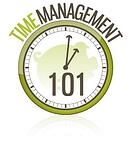 At some point in your life I bet you have taken some form of a time management class. Mine was the original Franklin Covey time management seminar, where you purchased the Covey planner of your choice and then learned how to effectively use it with the Covey system. Over the course of several years, I think I owned and attempted to use each planner size they made in hopes of finding the perfect solution for my needs. Obviously, something wasn't working, and I was searching for a workable answer.
At some point in your life I bet you have taken some form of a time management class. Mine was the original Franklin Covey time management seminar, where you purchased the Covey planner of your choice and then learned how to effectively use it with the Covey system. Over the course of several years, I think I owned and attempted to use each planner size they made in hopes of finding the perfect solution for my needs. Obviously, something wasn't working, and I was searching for a workable answer.
I feel the lesson isn't as much in the planning method (what planner you use) as it is learning and acknowledging how best you plan personally and recognizing if it's effective. On my team, we have one masterful planner that successfully, and wholly, uses Outlook as their source, while some use apps and others use the old fashioned hand held calendars in combination with their online calendars. One method isn't right and the others wrong. Instead, it gets back to knowing what works best for you individually and being honest with yourself in determining if the chosen system still leaves you feeling like you can't get everything accomplished.
The time on the clock is irrelevant; we all have the same 24 hours to use in a day. Real time is where we live. Sitting in the dentist's chair feels like time drags on, but while watching your babies grow into beautiful young adults, the time seemed to fly by. So if we agree that real time is what matters and is what we need to manage, then we need to go back to understanding how best we work, under what conditions, time frames, etc. Are you more productive first thing in the morning, in the afternoon, or do you need the quiet of the evening? This is where you need to start.
When I first read the article 10 Time Management Tips That Work, by Joe Mathews, Don Debolt, and Deb Percival, I have to say I was not on board. However, the more I read and the more I considered where my own personal time management challenges are or may be, I felt these tips were worthy of a try. Take a look and consider for yourself, in their words, these 10 tips.
Practice the following techniques to become the master of your own time:
- Carry a schedule and record all your thoughts, conversations and activities for a week. This will help you understand how much you can get done during the course of a day and where your precious moments are going. You'll see how much time is actually spent producing results and how much time is wasted on unproductive thoughts, conversations and actions.
- Any activity or conversation that's important to your success should have a time assigned to it. To-do lists get longer and longer to the point where they're unworkable. Appointment books work. Schedule appointments with yourself and create time blocks for high-priority thoughts, conversations, and actions. Schedule when they will begin and end. Have the discipline to keep these appointments.
- Plan to spend at least 50 percent of your time engaged in the thoughts, activities and conversations that produce most of your results.
- Schedule time for interruptions. Plan time to be pulled away from what you're doing. Take, for instance, the concept of having "office hours." Isn't "office hours" another way of saying "planned interruptions?"
- Take the first 30 minutes of every day to plan your day. Don't start your day until you complete your time plan. The most important time of your day is the time you schedule to schedule time.
- Take five minutes before every call and task to decide what result you want to attain. This will help you know what success looks like before you start. And it will also slow time down. Take five minutes after each call and activity to determine whether your desired result was achieved. If not, what was missing? How do you put what's missing in your next call or activity?
- Put up a "Do not disturb" sign when you absolutely have to get work done.
- Practice not answering the phone just because it's ringing and e-mails just because they show up. Disconnect instant messaging. Don't instantly give people your attention unless it's absolutely crucial in your business to offer an immediate human response. Instead, schedule a time to answer email and return phone calls.
- Block out other distractions like Facebook and other forms of social media unless you use these tools to generate business.
- Remember that it's impossible to get everything done. Also remember that odds are good that 20 percent of your thoughts, conversations and activities produce 80 percent of your results.
For a more productive you, try some of these on for size to see what personally fits and makes a difference. Our world continues to move at incredible speeds, so effectively managing that speed for better productivity will be our challenge. Good luck!

